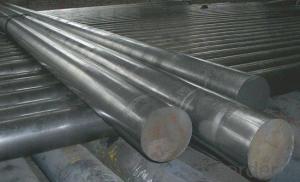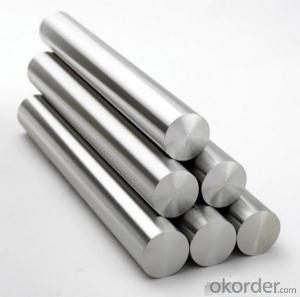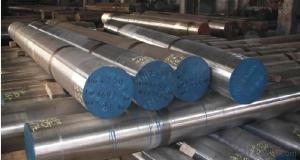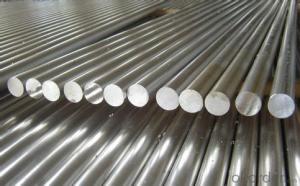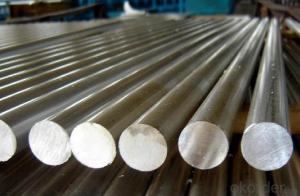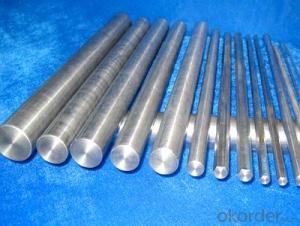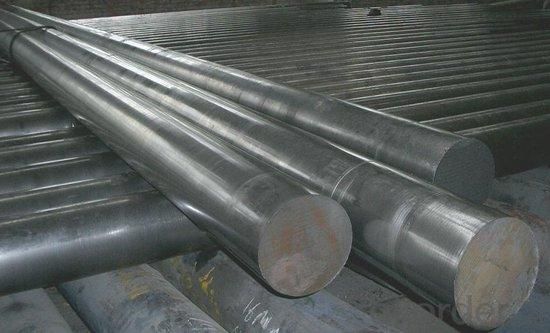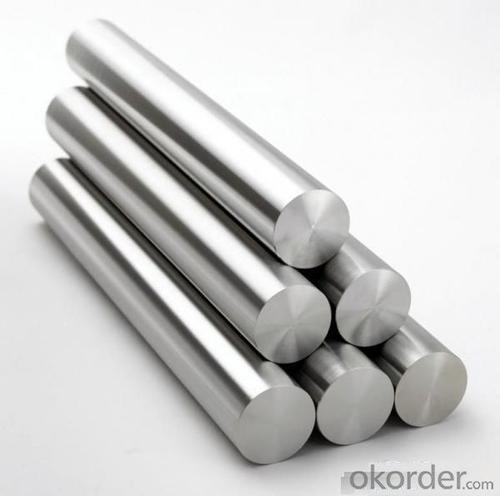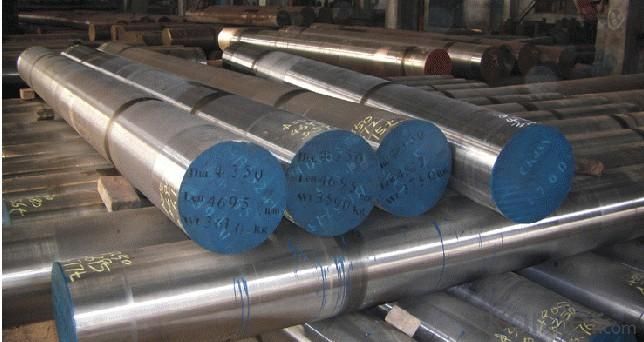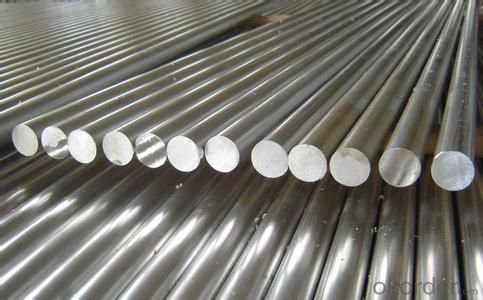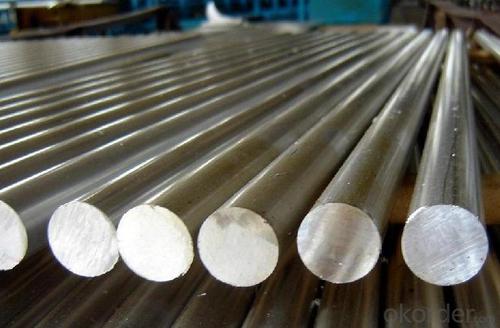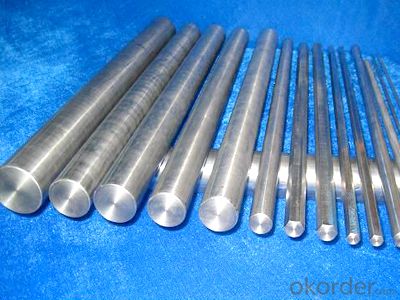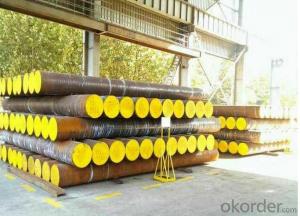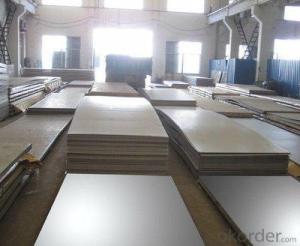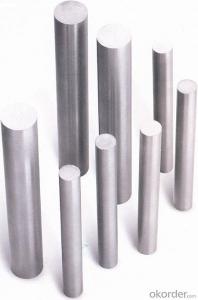Stainless Steel Round Bar Large Quantity in Stock
- Loading Port:
- Tianjin
- Payment Terms:
- TT OR LC
- Min Order Qty:
- 1 m.t.
- Supply Capability:
- 10000 m.t./month
OKorder Service Pledge
OKorder Financial Service
You Might Also Like
Specification
Stainless Steel Round Bar in stock
Descriptio of Steel Round Bar in Stock
(stainless steel round bar, angle bar , flat bar , channel bar , hexagon bar , square bar .)
1.grade:201,202,301,302,303,304,304L,308,309,310,310S,316,316L,321,410,420,430,etc.
2.diameter:3mm-400mm.
3.surface:bright , black , pickeled & bright .
4.length: no more than 6 m .
5.packing: according to international standards of export .
6.trade terms: FOBshanghai , CIF+import port .
7.payment terms: L/C at sight , 30% T/T in advance + copy of B/L .
8.delivery time: within 8 to 12 days since the receipt of payment .
9. MOQ is 1 ton .
Description of Steel Round Bar in Stock
Standard | AISI , JIS , ER , GB , ASTM , etc. |
| Grade | 201,201,301,302,303,304,304l,308,309,310,310S,316,316L,321,410,420,etc. |
| Application | widely used in the areas as ss fasteners , chains , kitchen and sanitary wares , furniture handles , handrails , electroplating and electrolyzing pendants , foods, electron , petroleum , construction and decoration , etc. with a high strength after cold-drawn , anti-stress corrosion , good surface . |
| Chemcial composition | according to international standards of ASTM , AISI , JIS , ER , GB ,etc. |
Company Information of Steel Round Bar in Stock
CNBM International Corporation is the most import and export platform of CNBM group(China National Building Material Group Corporation) ,which is a state-owned enterprise, ranked in 270th of Fortune Global 500 in 2015.
With its advantages, CNBM International are mainly concentrate on Cement, Glass, Iron and Steel, Ceramics industries and devotes herself for supplying high quality series of refractories as well as technical consultancies and logistics solution.
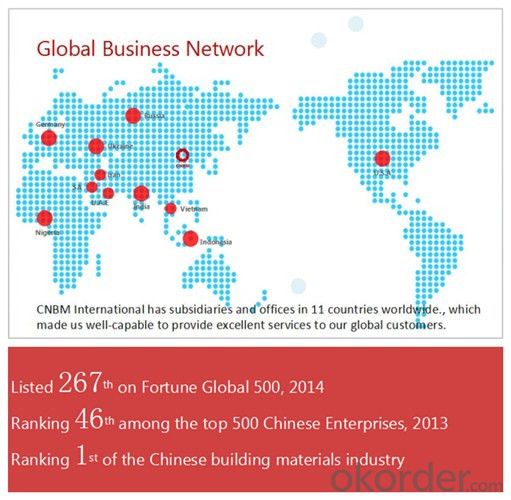
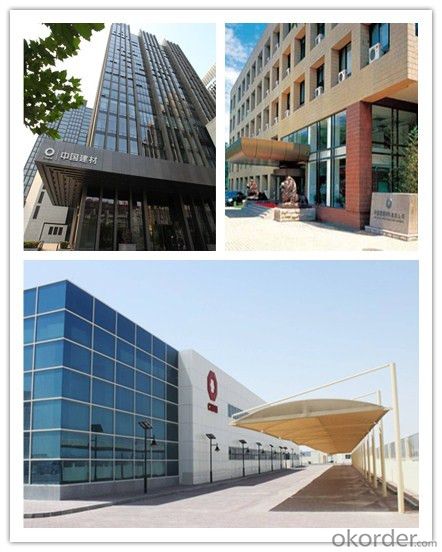
Packaging & Delivery of Steel Round Bar in Stock
Packaging Detail | Sea worthy packing /as per customer's packing instruction |
Delivery Detail | 15 ~ 40 days after receiving the deposit |
Products Show
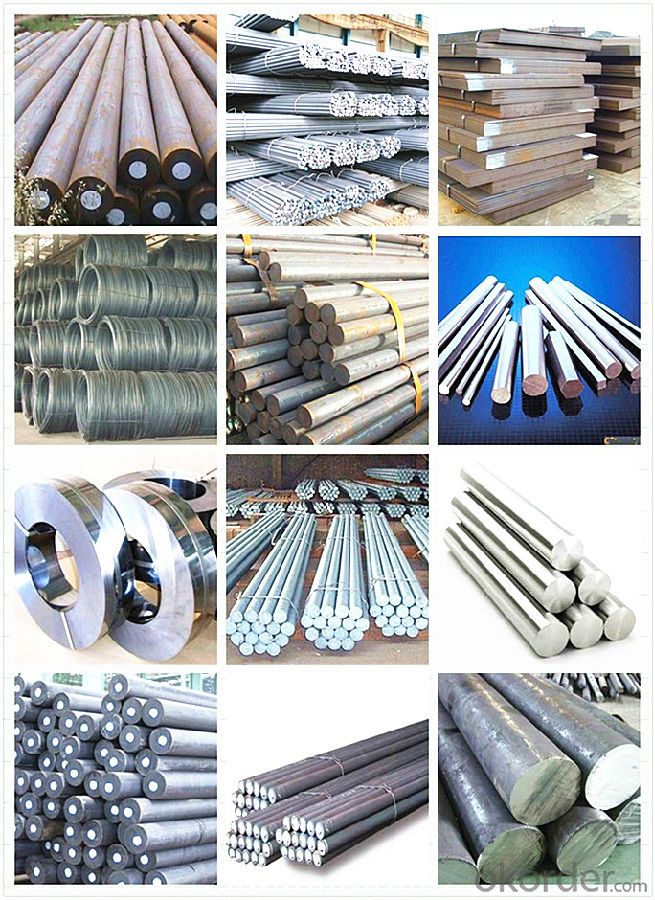
FAQ:
Are you a trading company or manufacturer? | Manufacturer |
What’s the MOQ? | 3 metric ton |
What’s your delivery time? | 15-35 days after downpayment received |
Do you Accept OEM service? | Yes |
what’s your delivery terms? | FOB/CFR/CIF |
What's the Payment Terms? | 30% as deposit,70% before shipment by T/T |
Western Union acceptable for small amount. | |
L/C acceptable for large amount. | |
Scrow ,Paybal,Alipay are also ok | |
Why choose us? | Chose happens because of quality, then price, We can give you both. Additionally, we can also offer professional products inquiry, products knowledge train (for agents), smooth goods delivery, excellent customer solution proposals. |
What's your available port of Shipment? | Main Port, China |
What’s your featured services? | Our service formula: good quality+ good price+ good service=customer's trust
|
Where are your Market? | Covering more than 160 countries in the world |
- Q: What are the different coating materials used for special steel?
- There are several different coating materials that are commonly used for special steel. Some of these include zinc, aluminum, nickel, and various types of polymer coatings. These coatings are applied to the steel to provide protection against corrosion, improve aesthetics, enhance wear resistance, or facilitate better adhesion for subsequent paint applications. The choice of coating material depends on the specific requirements and intended use of the special steel.
- Q: Can special steel be used in the battery manufacturing industry?
- Yes, special steel can be used in the battery manufacturing industry. Special steel, such as stainless steel or nickel-plated steel, can be used for battery casings, terminals, and other components due to its durability, corrosion resistance, and electrical conductivity properties.
- Q: How does stainless steel contribute to the automotive industry?
- Stainless steel contributes to the automotive industry by providing durability, corrosion resistance, and aesthetic appeal to various parts and components. It is commonly used in exhaust systems, engine components, body panels, and trim pieces, ensuring longevity and maintaining the integrity of vehicles even in harsh conditions.
- Q: How does special steel contribute to the automotive racing aftermarket industry?
- Special steel plays a crucial role in the automotive racing aftermarket industry by providing the necessary strength, durability, and performance required for high-performance racing vehicles. In this industry, where speed, precision, and safety are paramount, special steel offers unique properties that enable engineers and manufacturers to push the limits of performance. One key way that special steel contributes to the automotive racing aftermarket industry is through its ability to withstand extreme conditions. Racing vehicles are subjected to intense heat, pressure, and vibrations during high-speed races, which can put immense stress on various components. Special steel, with its exceptional heat resistance and high tensile strength, ensures that critical parts like engine components, transmission gears, and suspension systems can withstand these harsh conditions without compromising performance or safety. Furthermore, special steel is known for its lightweight properties, making it an ideal material for racing vehicle components. Weight reduction is a crucial aspect of racing as it directly impacts acceleration, handling, and overall performance. By using special steel, manufacturers can create lighter yet stronger components, allowing racing teams to achieve higher speeds, better maneuverability, and improved fuel efficiency. Special steel also contributes to the automotive racing aftermarket industry by offering excellent machinability and weldability. This allows for precise customization and modification of components, catering to the specific needs and preferences of racing teams. Whether it is creating custom engine blocks, exhaust systems, or chassis reinforcements, special steel provides the flexibility required to optimize performance and gain a competitive edge. Moreover, the use of special steel in the automotive racing aftermarket industry promotes innovation and technological advancements. Steel manufacturers continually develop new alloys and compositions that enhance the performance capabilities of racing vehicles. These advancements can include improved corrosion resistance, better fatigue strength, and enhanced material properties, all of which contribute to the overall performance and longevity of racing vehicle components. In summary, special steel is a vital contributor to the automotive racing aftermarket industry. Its unique combination of strength, durability, lightweight properties, and machinability enables racing teams to design and manufacture high-performance vehicles that can withstand extreme conditions. By leveraging the advantages of special steel, the industry can continue to push the boundaries of automotive racing, delivering faster, safer, and more efficient racing machines.
- Q: What are the different coating techniques used for special steel?
- Some of the different coating techniques used for special steel include hot-dip galvanizing, electroplating, powder coating, and metallizing.
- Q: How does surface treatment enhance the performance of special steel?
- Surface treatment enhances the performance of special steel by improving its corrosion resistance, wear resistance, and surface hardness, thereby increasing its durability, longevity, and overall performance in various applications.
- Q: Can special steel be used in the plumbing industry?
- Yes, special steel can be used in the plumbing industry. Special steel, such as stainless steel or alloy steel, is often preferred for plumbing applications due to its corrosion resistance and high strength properties. It is commonly used for pipes, fittings, valves, and other components in plumbing systems to ensure durability and longevity.
- Q: How does molybdenum improve the performance of special steel?
- Molybdenum plays a crucial role in enhancing the performance of special steel due to its unique properties and characteristics. First and foremost, molybdenum significantly improves the strength and toughness of steel, making it more durable and resistant to deformation. This is achieved by forming a solid solution with iron, which results in a fine-grained microstructure and reduces the formation of brittle phases in the steel. Moreover, molybdenum increases the hardenability of steel, allowing it to be heat-treated to obtain desired mechanical properties. This is particularly important in the production of special steel, where high strength, wear resistance, and thermal stability are often required. By enabling effective heat treatment, molybdenum ensures that the steel can be processed to meet specific performance requirements, such as hardness, toughness, and dimensional stability. Additionally, molybdenum enhances the corrosion resistance of special steel, making it suitable for various challenging environments. It forms a protective oxide layer on the surface of the steel, which acts as a barrier against corrosive substances like acids, alkalis, and salts. This resistance to corrosion is crucial in applications where the steel is exposed to harsh conditions, such as marine environments, chemical processing plants, and oil and gas industries. Furthermore, molybdenum improves the high-temperature strength and creep resistance of special steel. It enables the steel to maintain its mechanical properties even at elevated temperatures, making it suitable for applications where the steel is subject to prolonged exposure to heat or mechanical stress. In summary, molybdenum plays a vital role in enhancing the performance of special steel by improving its strength, toughness, hardenability, corrosion resistance, and high-temperature properties. These attributes make molybdenum an essential alloying element in the production of special steel for various industries, including automotive, aerospace, energy, and tool manufacturing.
- Q: How does special steel resist thermal fatigue?
- Due to its distinctive composition and properties, special steel possesses the ability to withstand thermal fatigue. When a material experiences repeated cycles of heating and cooling, cracks form and ultimately lead to material failure. Special steel, on the other hand, is specifically engineered to endure extreme temperature changes. It possesses a high melting point and exceptional thermal conductivity, enabling efficient heat dissipation and minimization of thermal stress. Furthermore, the steel is often alloyed with elements like chromium, nickel, and molybdenum, which augment its resistance to thermal fatigue. The alloying elements within special steel create a protective layer that acts as a barrier against oxidation and corrosion. This safeguard prevents crack formation and enhances the steel's capacity to withstand thermal cycling. Additionally, the alloying elements enhance the steel's structural integrity by encouraging the formation of finely dispersed and evenly distributed microstructures. This, in turn, amplifies the steel's toughness and crack resistance. Moreover, special steel undergoes various heat treatment processes to further enhance its resistance to thermal fatigue. These processes involve controlled cycles of heating and cooling, refining the steel's microstructure and rendering it more resistant to deformation and cracking. The heat treatment also aids in alleviating any residual stresses that may have been induced during the manufacturing process. In conclusion, special steel resists thermal fatigue due to its distinctive composition, alloying elements, and heat treatment processes. Its high melting point, exceptional thermal conductivity, and protective layer against oxidation and corrosion make it highly resilient to thermal cycling. The refined microstructure and alleviated residual stresses further strengthen its ability to endure repeated cycles of heating and cooling without experiencing failure.
- Q: How is special steel used in the manufacturing of tools and dies?
- Special steel is used in the manufacturing of tools and dies due to its exceptional properties, such as high strength, hardness, and wear resistance. These steels can withstand extreme temperatures and pressures during the forming, cutting, and shaping processes. They also have excellent dimensional stability, ensuring precise and accurate tooling. Special steel's unique composition and heat treatment capabilities allow for the production of durable and long-lasting tools and dies, which are essential for various industries like automotive, aerospace, and manufacturing.
Send your message to us
Stainless Steel Round Bar Large Quantity in Stock
- Loading Port:
- Tianjin
- Payment Terms:
- TT OR LC
- Min Order Qty:
- 1 m.t.
- Supply Capability:
- 10000 m.t./month
OKorder Service Pledge
OKorder Financial Service
Similar products
Hot products
Hot Searches
Related keywords
